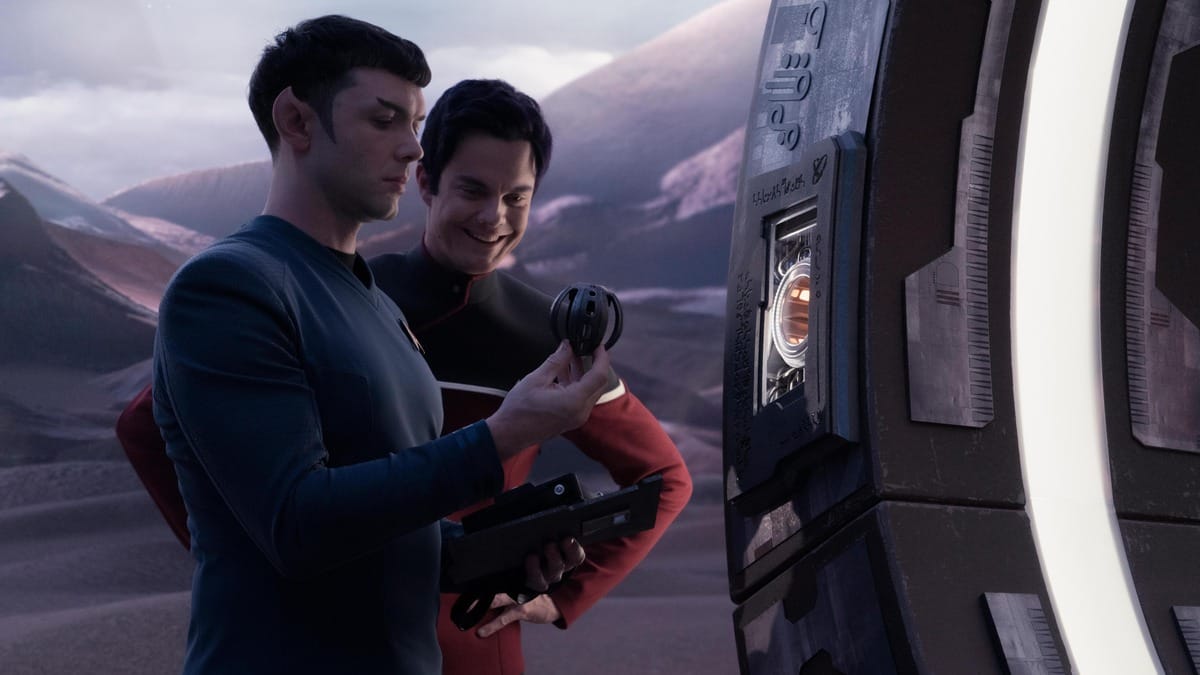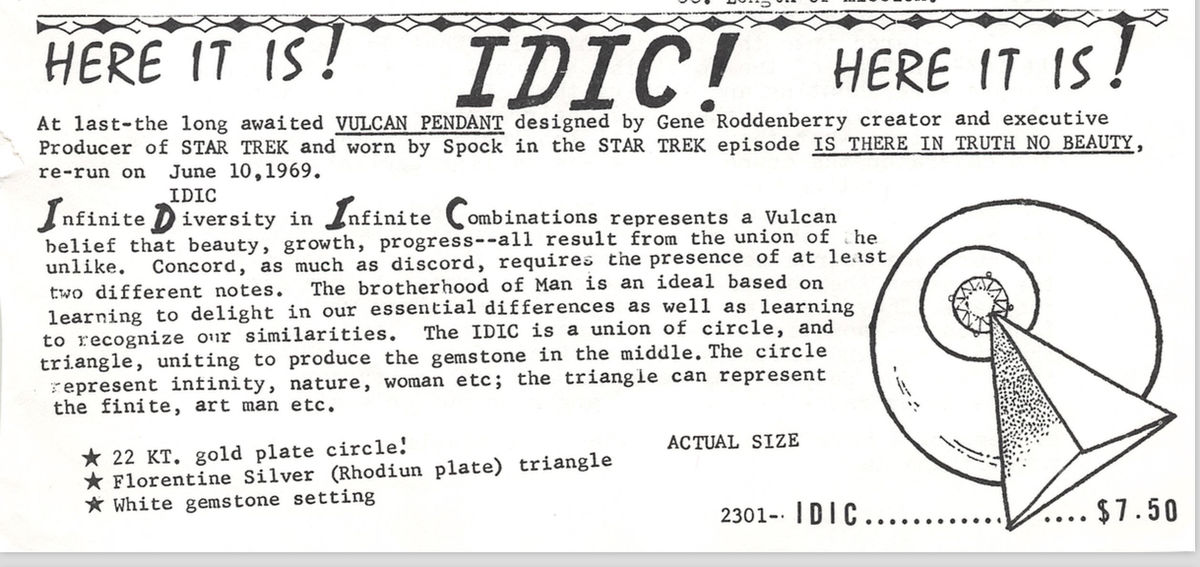
How do we manage our myths around ‘Those Old Scientists’?
Reading Time: 10 minutes I’ll be blunt: I do not like Star Trek: Lower Decks, an animated series set in the timeline for The Next Generation, and a crossover element in the first of this past week’s episodes of Strange New Worlds. When it comes to Trek comedy, the non-canon homage series The Orville
I’ll be blunt: I do not like Star Trek: Lower Decks, an animated series set in the timeline for The Next Generation, and a crossover element in the first of this past week’s episodes of Strange New Worlds. When it comes to Trek comedy, the non-canon homage series The Orville is more my cup of Earl Grey. Why? Because The Orville finds comedic moments within the context of its post-scarcity world. Lower Decks, conversely, doesn’t feel like it’s set in the real Federation, except for the costuming and set design. Almost all its plots rely on late-stage-capitalist labor practices, like staging The Office in Starfleet uniform.
I suspect it works well for some Trekkies because its characters are overtly “stans” of Trek lore, dropping franchise references and squeeing or flailing through each storyline as if LARPing at a week-long convention. A self-insert series, you know? But that concept doesn’t work well for this fan. If you haven’t seen or enjoyed Lower Decks, you might find this episode uncomfortable, too.
That said, this episode is directed by Jonathan Frakes, who has a good history of putting together solid hours of Trek in other franchises, after playing Commander Riker in The Next Generation. If you pay attention to the direction, you’ll see how he’s constructed some meaningful moments around the annoying characters who have time-traveled into our sincere era of Trek with their fast-talking, fannish unprofessionalism for “Those Old Scientists” (TOS? Get it? Ha ha).
Have there been crossover episodes before? Of course, though usually characters from one Trek series show up at the outset or close of another, to pass on the torch or mark the end of an era. We’ve even had beloved characters like Worf and O’Brien transition from TNG to Deep Space Nine for longer stints. The most ambitious crossover was “Trials and Tribble-ations” (DS9 S5E06), which blended footage from “The Trouble with Tribbles” (S2E15) for a plotline in which DS9‘s crew runs into its past. Star Trek: Generations (1994) also expressly involved Captain Kirk and Captain Picard working together to protect the timeline.
What has rarely happened is a collision not just of characters, but also of narrative tones. Lower Decks is plainly a show about fans of Trek: one who is over-the-top giddy about the thought of meeting and impressing his heroes, and the other who hides her adoration behind sarcasm and reckless indifference.
It is… not an easy fit for SNW. But if you find yourself gritting your teeth through this episode, eager to have these two ensigns sent home? Well, you can take comfort in the fact that most of the crew of the Enterprise feels the same.
And if not? There’s at least one classic TOS concept you can lean on instead: Infinite Diversity in Infinite Combinations. This is a bit of Vulcan philosophy that, oddly enough, doesn’t show up in this episode, even though there was ample opportunity for it to serve as a bridge between franchise cultures. When “Is There In Truth No Beauty” first aired in 1969 (TOS S3E05), it came with the opportunity for fans to buy a pendant just like the one worn by Spock, to celebrate their own commitment to the idea that “beauty, growth, and progress” emerge from the union of the unlike.

I have a little work to do in that realm myself, when it comes to making space for Lower Decks in my sense of Trek. So… let’s get to it, shall we?
But fair warning: we also have a musical coming up in Episode 9. Q save us all.
Establishing the stakes (Spoiler-free zone)
We start in the animated world of Lower Decks. Ensign Brad Boimler (Jack Quaid) on the USS Cerritos is excited to be visiting an ancient portal on Krulmuth-B, even if only on a routine inspection to make sure it’s still as nonfunctional as ever. (Hint: it will be functional!) He’s a little puzzled that Beckett Mariner (Tawny Newsome) is leading the mission, though, because she’s always such an eye-rolling critic of his excitement for anything related to the early days of space exploration, and especially the era of Spock, Pike, “Numero Una” (Number One, Una), and Uhura. But Mariner insists that she loves Uhura, the original badass who did it all: amazing at her work, and a girl who knew how to relax and have fun.
All four main characters of Lower Decks visit the site, where Boimler goes on about the Enterprise and their Orion friend Ensign Tendi gently suggests that her people discovered the portal instead. Boimler is skeptical, because Orions are known pirates, but Tendi points out that even pirates had to have had scientists to make the ships. Besides, her own great grandmother was on the vessel that discovered it.
They discover that the portal is showing trace amounts of horonium, which was used on the hull of NX-class ships. Instead of being cautious, Boimler does a terrible Spock impression on the portal while his friend Rutherford takes his photo, and the equipment plus the traces of horonium trigger the device. Boimler is thrown into the past, where he lands at the feet of Spock, Una, and La’an before passing out.
Aboard the Enterprise, which had indeed just discovered this portal on its way to Setlik II with a crucial grain shipment, giddy Ensign Boimler then tries to abide by the two key rules of time travel: try not to change anything in the past, and try not to say anything about the future. La’an also advises him of a third rule, from hard-won experience: try not to get attached to anyone here.
But Boimler can’t quite help himself. He’s shocked to discover a Spock who laughs, and he tells Nurse Chapel that this isn’t normal from his time, effectively confirming that her relationship with Spock is going to run its course. (She wells up with some pretty heartbreaking tears here, while trying to keep it together.) He also lets slip that Pike’s birthday is coming up, such that others in the crew plan a surprise party. And he worries Una, because she doesn’t know why he keeps running away whenever he sees her. Is her future that bad?
Also, in one of those twists that works out just the way the time stream is supposed to, Boimler interrupts an attempt by Pike to treat Orions near the planet as pirates. He tells them that this ship is full of scientists, which leads to Pike getting hoodwinked and the Orions stealing the portal. They have to bargain to retrieve it, which means giving up that precious cargo of grain for starving colonists. But at least the portal is back, and there’s just enough of a charge for one trip home.
In time, maybe, for Boimler not to do further damage to the past?
Challenging expectations (Spoiler zone)
Except that when the portal opens, Mariner leaps through instead, wasting the last of the horonium and doubling the headache for the Enterprise. Now they have two ensigns from the future with very poor time-travel etiquette. Mariner gets to meet Uhura and find out that she’s still a 22-year-old working hard to make a name for herself: no time for fun. But Mariner fixes that, getting her out for drinks with Ortegas (Orion hurricanes, minus the Orion delaq), where the casual encounter conveniently helps solve the puzzle of the portal’s alien language.
The inscription isn’t much use, though, because they still need to find horonium to go home, and the sector is clean out. Boimler is put to work with Spock to try to synthesize some, with disastrous results on the material sciences front but offering a key insight on the personal one. Spock knows that Boimler has made Chapel upset, and he’s figured out the reason why, but he also points out that even knowing this future is not sufficient reason to change the path he’s on right now.
Boimler, inspired by the suggestion to live as best he can in the moment, sneaks out to a shuttle to try to secure the return of vital grain from the Orions, at the very least. Even if he’s trapped in this timeline, he wants to do the best he can by those around him. La’an catches him and Mariner in the act, though, and they’re set to be confined until reaching Starbase 1. Pike notes that for someone who claims to be interested in following the rules, Boimler sure breaks a lot of them.
In the conversation, though, a reference to a classic ship, the NX-01, comes up, and Boimler has an “aha!” moment that saves the day: those ships were made with parts that had horonium in them, and every future ship carries a piece of the old ones in it, as a way of honoring the heritage. In other words, the Enterprise has one piece (in Pelia’s engineering floor!) with sufficient material to help Boimler and Mariner get home. On the way out, Una finally gets clarity about why Boimler’s been so fidgety around her: in the future, Number One is the poster girl for Starfleet recruitment, and her Ad astra per aspera speech is a huge part of why Boimler enlisted.
(Again, just constant fanboy-ing as plot progression. But it works for some!)
The Orions are waiting at the portal, though, having been called by Boimler in the shuttlecraft. Pike bargains for the continued use of the portal in exchange for promising to record that Orion scientists actually discovered it, which pleases this captain just fine. At last, the ensigns go home, where Boimler finds out that, for all her eye-rolling, Mariner actually fought for the assignment to make sure he’d get to see the portal. See? She’s not a mean girl. She just… acts mean and immature around things and people she likes. Totally different.
Back on the Enterprise, the crew has fixed themselves proper Orion hurricanes, care of the delaq provided by the Orions while patching up relations. This is the excuse given for why they’re all in animated color, freaking out at their cartoonish natures.
The end, thank goodness.
Humanist storytelling structure?
As noted above, the best thing I can say about this episode is that it had a good director at the helm. This isn’t to take away from the scripting, which also does a solid job of blending two completely different storytelling tones (no mean literary feat!). I simply want to highlight where SNW‘s strengths as a series come through, because while Lower Decks is glib and self-referential, you can still see SNW‘s empathy and curiosity in the pacing and staging of key interactions.
Joined with the sincere performances of Jess Bush as Nurse Chapel, Anson Mount as Pike, and Celia Rose Gooding as Uhura, this means that when our fast-talking future folk trip into saying things they shouldn’t, tipping the show’s hand with respect to ultimately abiding by the canon of TOS… We at least get to feel the pain caused by our guests’ presence. For Chapel and Spock’s probably ending relationship. For Pike’s impending date with a hard destiny.
La’an, too, gets to relive her loss by extending a warning to Boimler, and that’s another space where good acting in the rare beats carved out for the Enterprise speak volumes, despite this episode’s central focus on Boimler and Mariner.
But to what bigger end? Is there any greater value to having this silly collision of worlds in the first place?
Well, yes, actually. I think there’s a solid lesson or two to be taken here.
‘Those Old Scientists’: The thematic pay-off
One reason I’m not a fan of Lower Decks is because the characters represent only a superficial embodiment of Trek’s core values. They enjoy the gloss, the mythology, the fame, but that celebrity culture consumes even their commitment to parts of everyday life in the universe.
And I cannot stand celebrity culture. Name-dropping just makes my eyes glaze over.
But the crew of the Enterprise has a similarly unsettled relationship to learning that they’ll be famous in the future: because they’re busy doing the best they can in the present. One day at a time. One logical response to current crises at a time.
Which is where the greatest insight of this episode emerges: in Boimler listening to Spock’s mature response to having the future of his relationship with Chapel more or less revealed. After weeks of SNW writers teasing us with a will-they-or-won’t-they approach to the series timeline, we viewers are finally being given strong signs that La’an won’t be building a relationship with this world’s Kirk, Spock will keep to a more solitary canonical existence in the end, and Pike will meet with a brutal accident in service to saving lives. (Maybe. Unless there’s a curve ball.)
But also, we’re invited to enjoy the journey, irrespective of the destination.
This is a tricky concept in a culture that often reduces media events to “spoilers”, as if the ending matters more than any other element in our stories. But fatalist or teleological thinking can be our downfall, especially when crises like climate change acceleration make it difficult to imagine a future where we aren’t all ruined by the selfish actions of a few. If we give over to fatalism, if we allow ourselves to believe that nothing we do matters in the present because the future hangs a grim cloud over every choice we make… what benefit is that to any of us?
Camus famously wrote that we must imagine Sisyphus happy, even if we are all doomed to roll the same dread boulder up the same dread hill for all eternity. Why happy? Because even if we’re locked into unwavering tracks in time and space, we still have some choice with respect to our attitude in response to our circumstances.
For this reason, I’m giving this episode 2.5 happy humans. Yes, “Those Old Scientists” feels like a pretty silly entry into Star Trek lore. But even silly entries can remind us not to conflate gravitas or possible end-points with the most essential work of being human: which is to be here, in the moment, and to do the best we can with whatever it is we’ve got going on right now.
Quotes of note, and other Easter Eggs
The one plus of a crossover episode involving Lower Decks is that of course a show fixated on references would have snappy lines.
- Boimler: “Holy Q!”
Mariner: “Don’t yell Q! They haven’t met him yet. They had a kind of a Trelane thing going on.” [TOS S1E18] - Boimler: “Okay, not to be ungrateful, but if you had just waited like one more second, we wouldn’t be stuck here.”
Mariner: “Do, do you know how worried I was? You disappeared in a vortex while I was in charge. For all I knew, you were dead, or stuck in a dystopian San Francisco in the middle of a riot.” [DS9 S3E11,12]
Una: “Have you noticed that their references are weirdly specific?”
Spock: “Indeed.” - The NX-01 is of course the class of ship known to us from Enterprise, commanded by Jonathan Archer. Hoshi Sato, the linguist on that ship, is the hero that Uhura names when the crew of this Enterprise reflects on the people they admired from their own pasts (although they manage to admire the past without squeeing over it and/or making a mess of it, so every generation is different!).
- The grain shipment element isn’t out of the blue. In “The Trouble with Tribbles” (TOS S2E15), the Enterprise is on its way to Sherman’s Planet with quadrotriticale grain when it’s caught up in a silly adventure with everyone’s favorite rapidly procreating fuzz ball. This time, the Enterprise is on route to a planet in need with trititicale grain, when it gets disrupted by a silly adventure of its own.
- Even a reference to Nausicaans (through the language on the portal) has a deeper connection to the time-travel core of this episode. We first learn about the Nausicaans in TNG‘s “Tapestry” (S6E15), when Picard is given a chance to revisit a youthful “error” that caused him to lose his first heart after a bad encounter at a dom-jot table.
- Spock is considered “hot Spock” by Mariner and Boimler. This isn’t the first time he’s been ogled by time-travelers: Jadzia Dax does similar in “Trials and Tribble-ations” (DS9 S5E06).
Star Trek: Strange New Worlds
“Those Old Scientists”: Season 2, Episode 7

